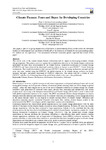Climate Finance: Fears and Hopes for Developing Countries
| dc.contributor.author | Gichira, Peter S. | |
| dc.contributor.author | Agwata, Jones F. | |
| dc.contributor.author | Muigua, Kariuki D. | |
| dc.date.accessioned | 2019-04-05T07:47:31Z | |
| dc.date.available | 2019-04-05T07:47:31Z | |
| dc.date.issued | 2014 | |
| dc.identifier.issn | 2224-3259 | |
| dc.identifier.uri | http://ir.mksu.ac.ke/handle/123456780/4241 | |
| dc.description.abstract | This article looks at the current climate finance architecture and its impact on developing countries climate change responses. The primary aim is to capture the contradictions that exist in the climate finance architecture particularly between those recommended by the United Nations Framework Convention on Climate Change (UNFCCC) and those advanced by developed countries otherwise known as non-UNFCCC climate financing mechanisms. The overall observation is that once non-UNFCCC climate financing mechanisms emerged and the more they were justified using the UNFCCC, the global response to the climate change problem was fatally wounded through a procedural derailment of UNFCCC objectives. This article calls for a review of nonUNFCCC with the aim of divesting them of the profit factor which in this case is the problematic. | en_US |
| dc.language.iso | en_US | en_US |
| dc.publisher | Journal of Law, Policy and Globalization | en_US |
| dc.subject | Climate | en_US |
| dc.subject | Finance | en_US |
| dc.subject | Mechanisms | en_US |
| dc.subject | Governance | en_US |
| dc.subject | Privatization | en_US |
| dc.subject | Stalemate. | en_US |
| dc.title | Climate Finance: Fears and Hopes for Developing Countries | en_US |
| dc.type | Article | en_US |
Files in this item
This item appears in the following Collection(s)
-
School of Environment and Natural Resources [101]
Scholarly Articles by Faculty & Students in School of Environment and Natural Resources

